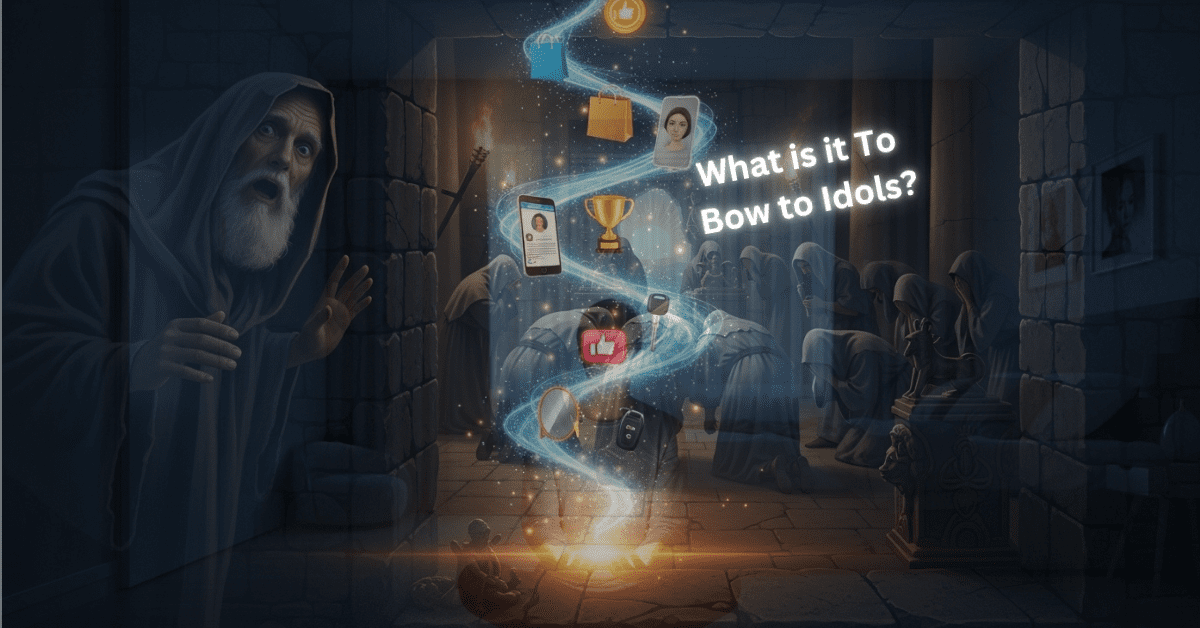Imagine stepping into a place you hold sacred—a sanctuary of faith, purity, and devotion. Now, picture peeling back the layers and discovering that within its very walls, secret sins and hidden worship are taking place. This is the shocking scene God revealed to the prophet Ezekiel thousands of years ago. He led Ezekiel on a tour of the temple, not to admire its beauty, but to expose the hidden idolatry lurking in its dark corners. While this was a literal event in ancient history, it serves as a powerful mirror for our lives today. We may not have physical idols, but what about the secret sins we tuck away in the corners of our hearts? This is a story about more than just a temple; it’s a reflection of us, and a call to face what we have hidden.

Ezekiel’s Shocking Revelation: A Gradual Corruption
The book of Ezekiel pulls back the curtain on a deeply unsettling truth. The prophet is taken on a divine tour of the temple in Jerusalem, a place meant to be the epicenter of pure worship. But instead of finding true devotion, he uncovers a horrifying scene: elders secretly bowing down to idols and women weeping for false gods. What’s most jarring is that this isn’t a recent problem, nor a sudden rebellion. This deep corruption, this slow fade from God’s ways, took generations to build. It began with seemingly small compromises, little bits of worldliness tucked away in the shadows, until they metastasized into a pervasive spiritual sickness. The sacred space had been hollowed out from within, becoming a monument to hidden sins.
Our Modern Temples: Where Hidden Idols Reside
It’s easy to look at Ezekiel’s story and think, “Well, that was ancient history with physical statues, far removed from our lives.” But what if we swap the old temple for our own lives, our hearts, our daily routines, and even our relationships? We might not have wooden idols, but we definitely have “sacred spaces”—our careers, our personal goals, our aspirations—where we often hide our own forms of hidden idolatry in our lives. This isn’t just about big, obvious sins. Often, our hidden idols are sneaky, showing up as things that seem harmless or even good on the surface, slowly taking God’s rightful place.
Unmasking the Subtle Idols Among Us
The real challenge, just like in Ezekiel’s time, is that these aren’t always glaring “sins.” They are often things that look good or are socially acceptable, but they slowly start to take God’s place in our hearts. They become the things we rely on, the things we worship, the things we put our hope in, without even realizing it.

Let’s explore some common, often-overlooked examples of these modern idols:
Pride Disguised as Ambition
It’s good to work hard, to achieve, and to pursue our goals. However, when our unchecked desire for success, recognition, or control becomes the most important thing—pushing God to the side—that’s a hidden idol. We might chase our careers so intensely, sacrificing our values or relationships, that we forget who truly gives us strength and purpose. Our own achievements become the altar at which we worship.
Approval Seeking as a False God
It feels incredibly good when people like us, when we’re validated and accepted. But if we constantly change who we are, what we believe, or what we do just to get others’ praise, then fitting in becomes our false god. We stop listening to our inner conviction or God’s gentle guidance, just to please the crowd. The fear of man can truly become a snare, binding us to the opinions of others rather than the truth.
Selfishness Masked as Self-Care
Taking care of ourselves is undoubtedly important for our well-being. But if “my needs” and “my comfort” always come first, above everyone and everything else—even above our responsibilities or the needs of those around us—then self-worship can sneak in. We might justify ignoring others, avoiding difficult situations, or neglecting our duties by simply calling it “self-care,” when it has, in fact, morphed into an excessive focus on self.
The Allure of Vanity and Over-Consumption
In our digital age, the pursuit of an ideal image and constant gratification can become powerful idols. Whether it’s endless scrolling through social media, meticulously curating an online persona for likes and comments, constantly buying new things to fill an inner void, or chasing the latest trends, these can become our hidden idols. We seek validation, excitement, or a sense of belonging in these fleeting things, instead of finding contentment and joy in deeper, more meaningful places. We become slaves to these habits, feeding our vanity and consumer desires rather than nourishing our souls.
A Call to Introspection and Spiritual Cleansing
So, what happens when we face these hidden parts of ourselves and confront the hidden idolatry in our lives? Just as God called Ezekiel to expose the truth within the temple, He calls us to look closely at our own “temples”—our hearts, minds, and actions. It’s an invitation to pause, to honestly assess where our true allegiances lie, and to turn back to Him.
This means confessing those subtle ways we’ve elevated other things before God and seeking His forgiveness and guidance. It’s a chance to truly clean house, not just the visible rooms, but the dark, forgotten corners where those secret idols might be hiding.
Let’s reflect on our own lives today. What are the hidden idols that have slowly crept into your sacred spaces? Acknowledging them is the crucial first step toward true freedom, deeper spiritual growth, and a more honest, devoted connection with God.

